The Heathens Guide to World Religions
Copyright 2011 by William HopperCover design by William Hopper Cartoon Illustrations by Kevin Jackson.All rights reserved.
No part of this book may be reproduced in any form or by any electronic or mechanical means including information storage and retrieval systems, without permission in writing from the author. The only exception is by a reviewer, who may quote short excerpts in a review.
William HopperVisit my website at www.heathensguide.comPrinted in the United States of AmericaFirst Printing: August 1997Current Edition: 2011 ISBN-10: 097315084X ISBN-13: 978-0973150841

Chapter One: JUDAISM
Religion: Judaism
Prophet/Holy Guy : Old Testament prophets/patriarchs from Adam to Malachi. Main Holy Book: Torah, Mishnahs
What to call the priest: Rabbi, Rebbe
What to Call an Adherent: Jew
Israel
To you I'm an atheist. To God, I'm the Loyal Opposition. ~Woody Allen
Okay, first off...forget The Ten Commandments movie. If youre going try using a Charleton Heston flick as historical reference, I suggest you use Planet of the Apes . Its no more accurate, but lets face it; a world run by apes is infinitely more interesting than a world run by Jewish patriarchs.
We can also forget about the In the beginning God created... bit from Genesis. Im a little too pragmatic to bother getting into the whole creationism versus Big Bang versus we-were-seeded-here-by-alien-life-forms debate. Each position has its merits, but basically it really doesnt matter. Were studying religion here, and religion started a hell of a lot later than the universe did. What does matter is the history, inasmuch as we can separate it from the bullsh- er, faith. Heres what we know...
Your average rabbi will tell you that this whole fiasco started in a mythical paradise called The Garden of Eden. As much as I love disagreeing with holy guys with long beards, I have to give them half a point on this one. I think it did start in a place called Eden. I just doubt it was the heavenly paradise weve been told about.
You see, according to the fable (sorry, Bible) a guy named God created two humans, Adam and Eve, who were the progenitors of the whole human race. Supposedly Adam and Eve screwed up, got tossed from the garden, and God sent an angel with a fiery sword to guard the gates and make sure that no one got back in. This whole tale might just be written off as pure fable except for two small, niggling things that bug me about it. First, the Jews had to come from somewhere. It does little good to dismiss the Eden story if we have to replace it with a new creationism wherein the Jews just popped into being. They had to have had some ancestral origin before they went off and slaughtered the Canaanites and took over the Holy Land.
Second, the bible gives a pretty good description of where the place is geographically. Eden was not some mystic realm of winged faeries and giant dancing snakes. In Genesis, Eden had a clear physical locale identified by the rivers around it. There were four according to the tale. I hate to do this to you, but heres a bible reference for youGenesis 2, verse 10-14. Youll need it when arguing with religious folks about this. Its really the only language they speak.
Genesis 2, verse 10-141 says:
A river watering the garden flowed from Eden; from there it was separated into four headwaters. 11 The name of the first is the Pishon; it winds through the entire land of Havilah, where there is gold. 12 / 13 The name of the second river is the Gihon; it winds through the entire land of Cush. 14 The name of the third river is the Tigris; it runs along the east side of Asshur. And the fourth river is the Euphrates.
We know the Tigris and the Euphrates. Theyre pretty famous rivers. Its this whole Pishon and Gihon thing thats been keeping the location of Eden a deep secret for millennia. Basically, if you found all four rivers, go to the root of them and there you have itone Land O Heaven on Earth.
As much as Id like to take the credit for all of this, I have to admit that a British archaeologist named David Rohl has done a hell of a lot of excellent work on finding Eden while Ive merely pondered the concept over cappuccino and cigarettes. In his book Legend: The Genesis of Civilization ,2 Rohl explains how he followed the known rivers, talked to the locals, did some research, and found the place. You can get right into this by reading his stuff, but to make a long story short Rohl figured out that Pishon is now Uizhun and Gihon is Araxes, which put the location of Eden in Iran, ten miles outside of a city named Tabriz.
In April, 1997, Rohl led an expedition to the site, found far more evidence than even he thought he would, and pretty much proved to the world that Eden was a physical place well known to many cultures. However, as he did not find a giant angel with a fiery sword guarding the place, most Christians and Jews tend to believe that Rohl is nuts. They figure that all of the silly facts, archaeology, and history Rohl presents falls apart in the absence of a giant angel with a fiery sword. There has to be a giant angel with a fiery sword. It doesnt matter if everything else fits. No Angel, no Eden. Thats all there is to it. The Bible can not be wrong.
It astounds me that people who think like that actually rule a good portion of this planet. T HE H ISTORY B OOKS
The people we now recognize as the Jews first enter popular history as a collection of nomadic tribes on the Northern Arabian Peninsula somewhere around 10,000 BC.3 Now, everyone you ever quote that date to is going to have a different opinion, so dont take that as, well, gospel. I settled on 10,000 BC because thats where carbon dating of artefacts found in the region puts the timeline. I dont really trust carbon dating but its what we have to go with for now.
These folks basically wandered about the area going from oasis to oasis, trying to find grazing land for their goats, sheep, etc. Contrary to myth, they really werent desert dwellers. They lived mostly on the edges of the desert, keeping near the coastline and on the major routes. The area they were in was harsh, with small patches of green land, and they had to dig wells to find water.
The big surprise to most religious folks is that these guys were not monotheistic, meaning that they didnt worship just one god. That didnt come along for another, say, 5,000 years. Their gods (called collectively the elohim ) were beings that inhabited nature. Special rocks or oases were considered to be filled with the entity of a god. There was nothing complex here. Basically it was just an extended version of a child looking up at the clouds when its thundering and saying, Hey-God must be bowling. The whole world was a mystery back then. As they didnt know about tectonic plates or barometric pressure, they just called them gods.
Now, youve got to figure it was a pretty harsh life back then, and there wasnt a lot of room in this society for deep thought and contemplation. If they found areas that seemed more powerful than others or seemed to have more food than others, they decided that there had to be a reason for it. Since they didnt know quite what the reason was, they said there were elohim, or gods there. (Actually, the modern idea of a genie is closer to their idea of the elohim than the JudeoChristian concept of a god, but I figure if I kept saying genie wed wind up losing the thread linking all this stuff to what JC was doing hanging on a cross several millennia later.)
Anyway, you get the idea. If it was a good god/genie, youd sacrifice a goat and say, Hey, thanks. We really appreciate the help and please dont forget us in the future. If it was a bad god/genie, youd sacrifice a goat and say, Excuse me...Mr. God? Uh...well be passing by here this week and if youd be kind enough not to fry us to little cinders just for fun of watching us melt like candle wax, wed really appreciate it. To show you how much wed appreciate it, Im giving you this here goat and I hope you like it.

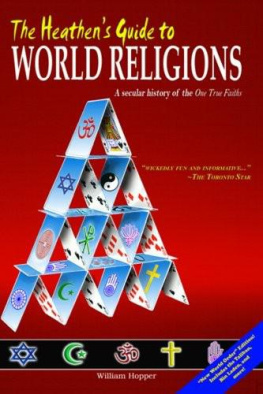
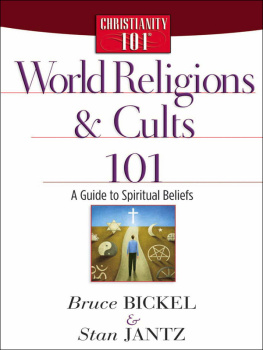
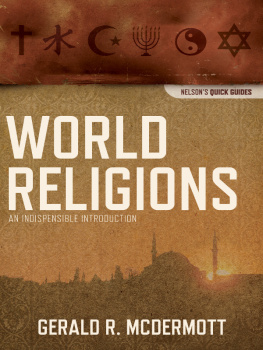


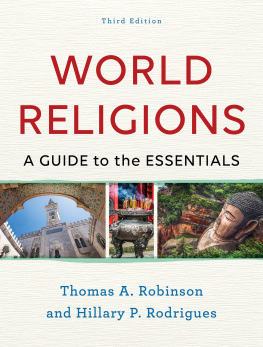


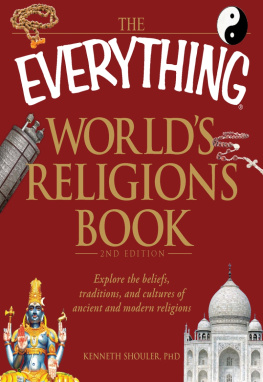
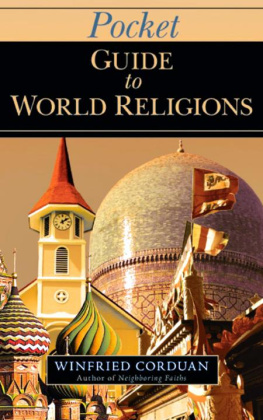
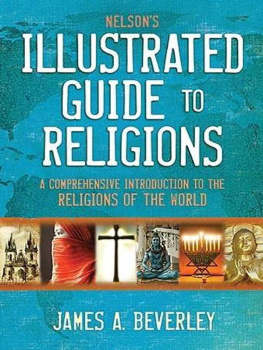
 Chapter One: JUDAISM
Chapter One: JUDAISM